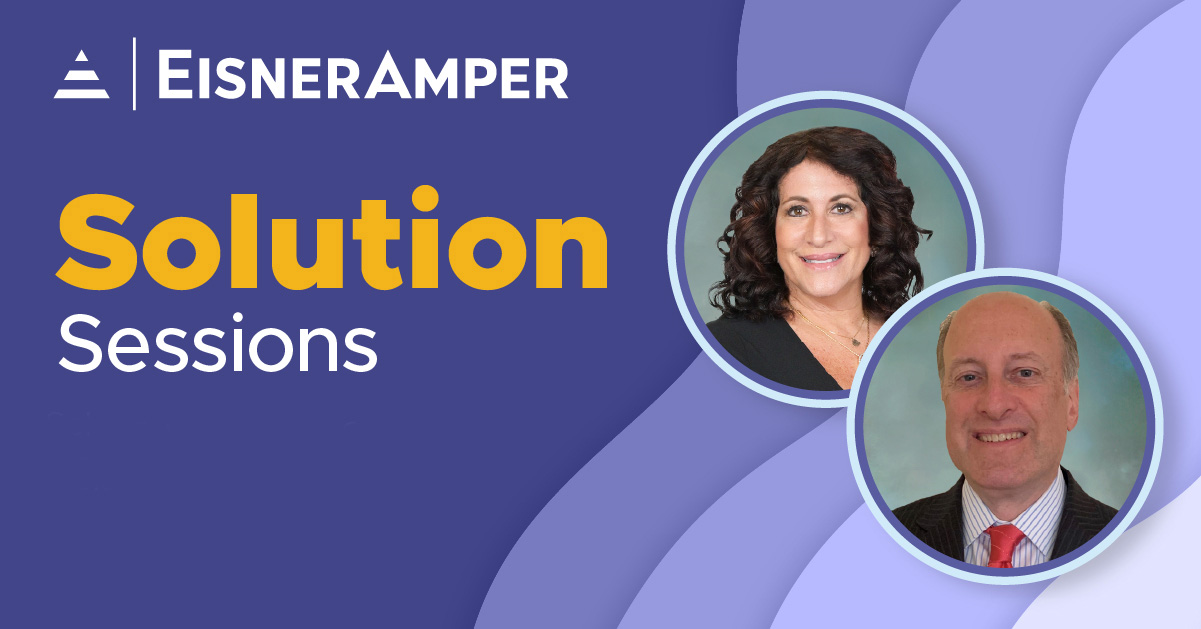
Protecting Your Most Valuable Asset in Turbulent Times
- Published
- Feb 16, 2021
- Share
Dr. Matt Kerzner, Director with the Center for Individual and Organizational Performance, draws upon his 30+ years in the fields of strategy and HR to share best practices in these quickly changing times. This is the first in a series of informative podcasts, featuring subject matter experts, informative case studies and a wealth of examples to empower and equip our clients with the tools they need to protect this important business investment and secure their future.
Transcript
Lisë Stewart: Hello, I'm Lisë Stewart and I am the principal in the Center for Individual and Organizational Performance and I'm really excited today to work here with my colleague, Matt Kerzner. He's a director in the center and we are launching the CIOP HR series. We're delighted with this because we know that there's a real need and we can answer your questions. So Matt, thanks for joining me. And I know that really you're the star of the show, not me. So I've got a lot of questions for you.
Matt Kerzner: Thanks Lisë. Thank you.
LS: Sure. Can you start out by telling us a little bit about what are these HR services? Like what do we mean when we talk about the fact that we provide HR services?
MK: Yeah. So we provide opportunities for small, medium, and even large size companies with all their possible needs. Like strategic planning, giving some advice and counsel, we can help them diagnose and prescribe problems that they might be having with their human capital. We absolutely help with talent management, with the methodology of bringing in a C-suite executive that might be, or needs to be the right cultural fit for the company. We do facilitation and mediation so we can help mediate conflicts that are happening between business owners or siblings. Or we might simply have to facilitate meetings, put some agendas together, help with transparent communication to make sure that the communication is flowing. And the last piece is we help with workforce analytics, helping look at technology to get the right human resource information or data so leadership can make solid decisions on a very timely basis.
LS: Wow, it's a lot. I think it's a lot, it's a big field. It can be pretty complex. So just in a nutshell, why should somebody actually hire an HR specialist like you? Like what would be the reason for doing that?
MK: Great point. So I'll start with private equity. Why private equity would want to use an HR consultant to help them is one, they have to do due diligence. They're going to come in and they're going to spend a lot of money purchasing and either buying or selling companies. And they want to really make sure that what they're buying, the leadership team, the management team, is solid. So we can come in and we can introduce some hiring methodologies, do some assessments and analyze the current leadership and then give feedback to private equity to say, okay, these are A players. Or some of them are A players and we might have to introduce some other people that might be a better fit to help that organization be successful. That's one example.
Another example could be that you have an owner, a third generation owner who is looking to transition the business to the fourth generation. But they don't really understand if the fourth generation is qualified to actually sit in the CEO seat. So we can come in and we can really help analyze who this person is today and possible predict the future success of being that CEO. With the hiring methodology, the succession planning process, or simply stated, there could be a conflict amongst the leaders in the organization. Or if you're running a department and you have team members that aren't getting along, we can actually help resolve some of those conflicts by having transparent communication meetings.
LS: Thanks Matt. I think it could probably give us a lot of examples and it just shows it's a pretty complex area and there are plenty of ways in which you can help. So Matt, can you maybe just, like give us an example of an HR issue that companies today are facing, like something that's really pertinent and sorts of things that we can do to help. So I want to make sure that our listeners leave with some really good tips. So can you give me an example?
MK: Yeah. I'm going to give one that's extremely relevant right now. Think about all of what's going on with COVID today. Most employees are not going into an office. So that means that if you are hiring right now, most candidates are not going into an office for an interview or even getting onboarded when they're coming into an organization. So let's think about this for a minute. They interview with either the hiring manager. They're not going in, they're not seeing the break room, they're not seeing a conference room, they can't even look at the walls or posters to see the culture of the organization. So organizations are spending all this money, trying to hire a right fit for their organization. And the perspective employee has no sense of who they're going to be working with and what that culture is. So think about onboarding a new employee, and then having them go through orientation, their first 30, 60, 90 days, if not longer, and never truly get a sense of the culture of the organization.
So one of the things that we can do to help is really take a look, how they onboard people. Is there some type of video that really can get into the mission, vision, and values and the goals that the leadership wants their employees to be like? Do they have a mentor program where they can actually assign a mentor that could help a new employee get settled in within the first 90 days, even if they never step into the organization?
So it's really important that we come in and we have this fresh pair of eyes to really help an organization look at how they're doing things currently or what they used to do in the past. And then based on best practices and what is going on in today's environment, really help them, what I call, move the furniture around, and really help bring some processes in that could make them successful in the future. And this whole virtual workplace is a perfect example of that.
LS: Yeah, I would absolutely agree. I certainly know plenty of examples where people are starting jobs fresh and they're never seeing their new workmates in person. So I totally agree. It's an important challenge. And I think companies that get it right, really make a difference. You want to start people off on the right foot. Well, Matt, thank you so much for kicking us off in this series. As I understand it, you're going to have plenty of opportunities to offer more podcasts, with guest speakers, and really topics that are very relevant today. So, we so appreciate you taking a few minutes to share with our audience what they can expect. And I'm really looking forward to listening to the rest of the series.
MK: Thank you, Lisë. It's a pleasure talking to you today.
LS: Great. Well, if you'd like to have some more information, we have plenty of it on our website, please visit eisneramper.com/ciop.
Also Available On
Contact EisnerAmper
If you have any questions, we'd like to hear from you.
Receive the latest business insights, analysis, and perspectives from EisnerAmper professionals.









